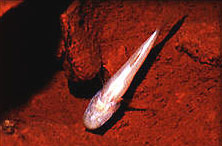| Amblyopsidae (Cavefishes) |
| 6.2 cm TL (male/unsexed) |
|
demersal; freshwater, potamodromous |
| North America: Springfield Plateau in southwestern Missouri, northeastern Oklahoma and northwestern Arkansas (Arkansas and upper White River drainages), USA. |
|
Dorsal soft rays (total): 7-8; Anal soft rays: 8. Pink-white. No eyes (vestigial eye tissues under skin). No pelvic fins. Usually 8 anal rays; 9-11 branched caudal rays. |
| Adults inhabit subterranean waters of quite small cave streams. Preferred habitat in these caves is chert rubble though individuals are also found in areas of silt-sand substrates. Stomachs examined contained copepods which constituted about 70-90% by volume with the balance being primarily small salamanders, crayfish, isopods, amphipods and young of their own species (Ref. 34868). Eggs are carried in gill chambers of females (Ref. 205). Threatened by overfishing (Ref. 10172). |
|
Near Threatened (NT); Date assessed: 26 April 2012 Ref. (130435)
|
| harmless |
Source and more info: www.fishbase.org. For personal, classroom, and other internal use only. Not for publication.
